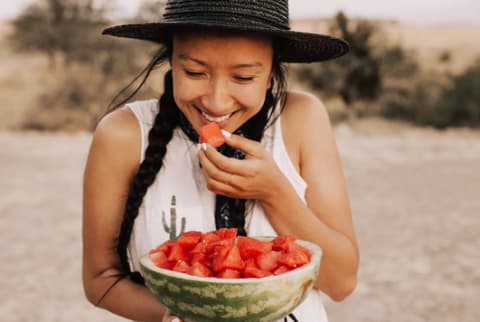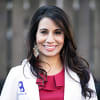Advertisement
Exactly What To Eat In A Day To Look & Feel Years Younger


When it comes to turning back the clock, food can be your most powerful medicine, or it can be your greatest weakness. I see it all the time—and the biological clock isn’t what determines health. I know 90-year-olds who have the energy and stamina of 20-somethings, women turning 50 who look and feel 30, and sadly, younger women who come in with conditions such as diabetes, heart disease, and aches and pains that you’d expect to see in someone much older. The common thread? Diet.
Knowing how to navigate the do's and don’ts of nutrition will make or break your health when it comes to slowing and even reversing the aging process. I often talk of five main factors when it comes to aging—genetics, digestion and the gut, hormone balance, weight, and diet—but really all are critically influenced by what you do—and don’t—eat on a daily basis. Today, malnutrition in the United States and other First World countries is less about the availability of food and much more about navigating and avoiding the hordes of packaged and processed foods that are easy, convenient, and cheap to consume 24/7. To begin eating younger, the first step is to understand your body and your unique chemistry.
Now, maybe you are thinking, "Hold on! I’m born with my genetic makeup—I can’t change that." Not true. Today we know that many genetic factors, especially how genes are expressed, can be changed by your environment—and this is especially true when it comes to what you put into YOUR environment—food! For example, you might be fast-tracked (thanks to the genes your parents gifted you) to be at risk of memory loss or heart disease, but you can change your genetics by following a diet and lifestyle activities that promote brain function and lower cardiovascular disease. Get it? As the field of genetics continues to expand, nutrition is without a doubt one of the key factors in aging and prevention.
Thankfully, today we also know that the right nutritional choices will keep you young by optimizing and balancing your hormones, gut, and weight.
What's the best type of diet for reversing aging?
When it comes to anti-aging eating, most nutrition research recommends that the best diet is a semi-vegetarian, Mediterranean-style way of eating. This diet maximizes fruits, vegetables, and healthy fats and minimizes refined and processed sugars and carbohydrates, dairy, and unhealthy fats. This diet has been shown to be higher in omega-3 fats, lower in omega-6 fats, and has a low glycemic index. As a quick reminder, omega-3 fats are the fats that help support the brain and hormones and also help fight inflammation. Omega-6 fats are those that are omnipresent in our diets—meats, dairy, common cooking oils like canola and corn oil, etc., all have omega-6 fats.
So, what does an age-defying day of eating look like?
Throughout the day you want to avoid:
- inflammatory foods
- sugar
- white flour
- alcohol
- processed foods
- food Additives
- high-fructose corn syrup
- hydrogenated fats
Here are a few more simple do's and don’ts to get you started on your youth-enhancing diet today:
Breakfast
Do: Start every day with a warming tonic.

Begin your day with a 1-cup serving of a warming tea tonic to wake up your mind and your digestive system. I like starting with a cup of ginger or lemon tea. Simply pour boiling water over a black or green tea bag. Add a few slices of fresh ginger or squeezed fresh lemon—also great together—and a teaspoon of honey, if you like. The lemon and ginger will wake up your digestion and balance out your gut microbiome and your hormones.
Don't: Eat packaged, grab-and-go food.
Obvious, I know, but I’m still shocked at how many women I meet who think that they are doing themselves a favor by grabbing a granola bar (most are just glorified Pop-Tarts). Instead, take a minute and make a fast smoothie—a couple scoops of protein powder (I like pea-protein powder), a cup of frozen berries, and a cup of almond milk. This antioxidant and protein-rich meal-in-a-cup will keep your blood sugar steady and your brain and body revved until lunch.
Lunch
Do: Pack your lunch.
Of course you’ll have exceptions to this, but you have so much more control over what—and how much—you eat when you plan ahead and bring it from home. I set aside time on the weekends to make up a week’s worth of lunches. That way all the work is done when I’m running bleary-eyed through the morning madness.
Don't: Eat red meat.
While I don’t necessarily advocate going full vegetarian, cutting out the foods that are hardest on your digestive system such as beef, lamb, and goat can help heal your gut, which will balance your hormones and reduce inflammation.
Snacks
Do: Eat seeds.
Chia seeds and pumpkin seeds are great anti-aging snacks. Chia seeds are full of omega-3 fats to help your memory stay sharp, and pumpkin seeds are nutritional powerhouses with protein, magnesium, and zinc.
Dinner
Do: Plan ahead and watch your portions, especially at night.
After a long day of work, parenting, traffic, etc., your willpower is at its lowest—and you might be starving, to boot. This is the time of day that most people lose their handle on eating and make poor choices, or eat too much. I always make sure to have healthy dinners planned ahead of time, when my brain and willpower are fresh.
Don't: Eat anything fried.
Fried foods only contribute to any inflammation in the body, and reducing inflammation is really important when trying to reverse the aging process. I recommend avoiding fried foods throughout the entire day; however, I definitely tell patients to leave them off the dinner plate. Why? Because you don’t want to eat the bulk of your day’s calories at night when you are least active. So leave off the fries, skip the battered fish or chicken, and put down the bag of potato chips—you’ll in turn help to slow the aging process down and keep those extra few pounds off.
If you want to learn more about eating for longevity from Dr. Taz, be sure to check out mbg's new functional nutrition program!

Dr. Taz Bhatia is a board-certified physician, specializing in integrative and emergency medicine, pediatrics and prevention, with expertise in women’s health, weight-loss, hormone balance and nutrition. She attended Emory University, the University of Georgia and the Medical College of Georgia, and was a recipient of the Emily Gardner Award for Best Pediatric Resident in 2000. She is the author of the Superwoman RX and The 21-Day Belly Fix. Personal health challenges in her twenties combined with a broken health care system motivated Bhatia to pursue an alternative definition of health and healthy living. As a young resident, she was sick and without answers, and began searching for help to heal her health issues. Studying various systems of medicine including Chinese Medicine, Acupuncture and Ayurveda, she found a wealth of information not yet taught in conventional medical schools. It led her to opening her now nationally-recognized practice, CentreSpring MD (formerly Atlanta Center for Holistic and Integrative Medicine). Today, Bhatia and her team work relentlessly to find a patient’s core health problems, their centre, in order to spring them forth in health, pulling from multiple systems of medicine, including integrative, functional, Chinese and holistic medicine.
More from the author:
Functional Nutrition Training
Check out Functional Nutrition Coaching
A cutting-edge nutrition deep dive taught by 20+ top health & wellness experts
Learn moreMore from the author:
Functional Nutrition Training
Check out Functional Nutrition Coaching
A cutting-edge nutrition deep dive taught by 20+ top health & wellness experts
Learn more
Dr. Taz Bhatia is a board-certified physician, specializing in integrative and emergency medicine, pediatrics and prevention, with expertise in women’s health, weight-loss, hormone balance and nutrition. She attended Emory University, the University of Georgia and the Medical College of Georgia, and was a recipient of the Emily Gardner Award for Best Pediatric Resident in 2000. She is the author of the Superwoman RX and The 21-Day Belly Fix. Personal health challenges in her twenties combined with a broken health care system motivated Bhatia to pursue an alternative definition of health and healthy living. As a young resident, she was sick and without answers, and began searching for help to heal her health issues. Studying various systems of medicine including Chinese Medicine, Acupuncture and Ayurveda, she found a wealth of information not yet taught in conventional medical schools. It led her to opening her now nationally-recognized practice, CentreSpring MD (formerly Atlanta Center for Holistic and Integrative Medicine). Today, Bhatia and her team work relentlessly to find a patient’s core health problems, their centre, in order to spring them forth in health, pulling from multiple systems of medicine, including integrative, functional, Chinese and holistic medicine.

Why Nutrition Is Key To Changing Your Relationship With Alcohol
Brooke Scheller, DCN, CNS

Why Alcohol Sabotages Your Gut Health & How To Get Back On Track
Brooke Scheller, DCN, CNS

Why Nutrition Is Key To Changing Your Relationship With Alcohol
Brooke Scheller, DCN, CNS

Why Alcohol Sabotages Your Gut Health & How To Get Back On Track
Brooke Scheller, DCN, CNS

Why Nutrition Is Key To Changing Your Relationship With Alcohol
Brooke Scheller, DCN, CNS

Why Alcohol Sabotages Your Gut Health & How To Get Back On Track
Brooke Scheller, DCN, CNS

Why Nutrition Is Key To Changing Your Relationship With Alcohol
Brooke Scheller, DCN, CNS

Why Alcohol Sabotages Your Gut Health & How To Get Back On Track
Brooke Scheller, DCN, CNS














